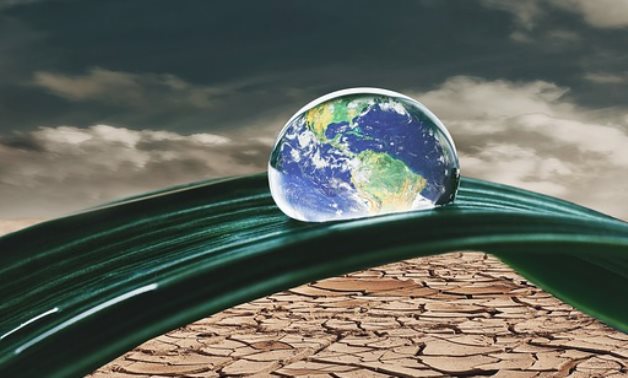
Abstract composition in which I represent climate change, in which the planet is only protected by a small dome of water- CC via Pixabay/ ELG21
CAIRO – 3 January 2025: Egyptian Minister of Water Resources and Irrigation Hani Suwailem said that Egypt faces the greatest water stress in the Nile Basin, while the upstream Nile source countries benefit from substantial water resources.
In his speech at a gathering with a group of youth and in presence of the Minister of Sports and Youth Ashraf Sobhy, Suwailem added that Egypt and Sudan receive only 3% of the rainfall that falls on the upstream countries, which is estimated to be about 1,600 billion cubic meters annually. In contrast, the total rainfall across the entire Nile Basin (both within and outside the Nile Basin countries) is about 7,000 billion cubic meters annually.
He also emphasized Egypt’s commitment to ongoing cooperation with its African neighbors, particularly the Nile Basin countries, through various support initiatives. Over the years, Egypt has invested $100 million in projects that directly benefit the citizens of these countries, he clarified. These include dam projects to capture rainwater, solar-powered groundwater wells, river ports, the clearing of waterways from invasive species, the establishment of water quality monitoring and forecasting centers, as well as providing technical support through Egyptian missions in Sudan, South Sudan, and Uganda.
Additionally, Egypt has contributed to technical studies requested by the Nile Basin countries and offered a variety of training programs for African specialists in water management and climate change adaptation.
Suwailem also pointed to the water challenges facing Egypt, where annual water needs total 114 billion cubic meters, while the country's available water resources do not exceed 60 billion cubic meters. To address this gap, Egypt reuses 21 billion cubic meters of water annually and imports crops equivalent to about 33.5 billion cubic meters of water (referred to as "virtual water").
He added that Egypt's water resources are under increasing pressure due to a continuous population growth of about 2 million people annually, which further strains the country’s limited water supply and complicates efforts to ensure food security. In response, the Egyptian government has adopted a new approach to irrigation, known as "Irrigation System 2.0," which aims to optimize water usage and enhance agricultural productivity.
Comments
Leave a Comment